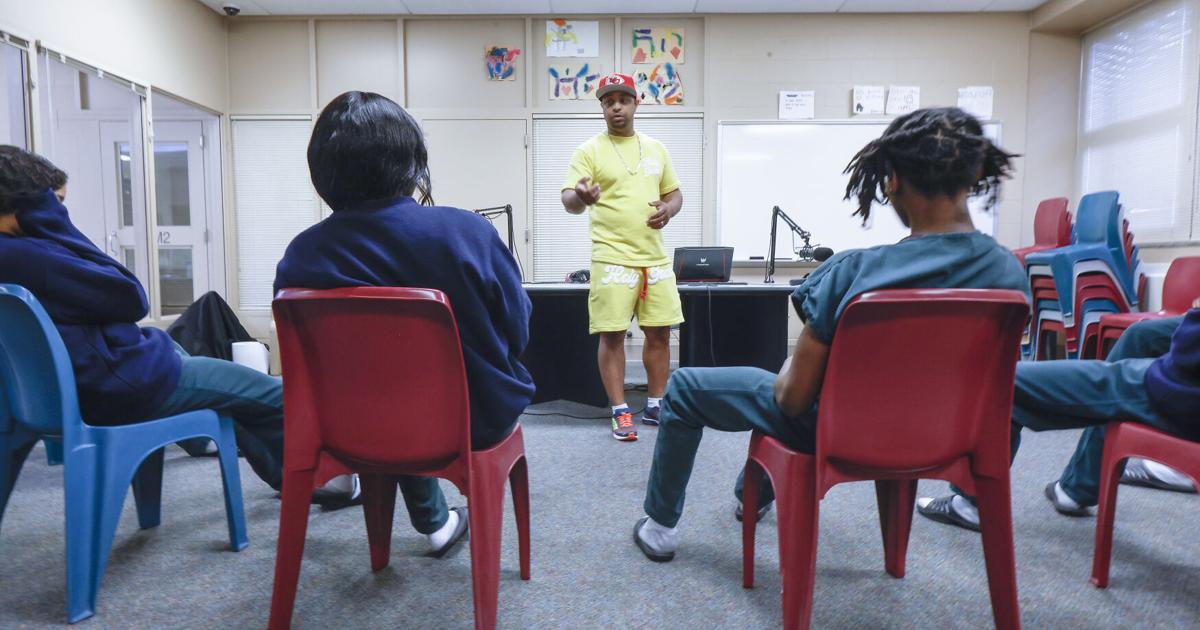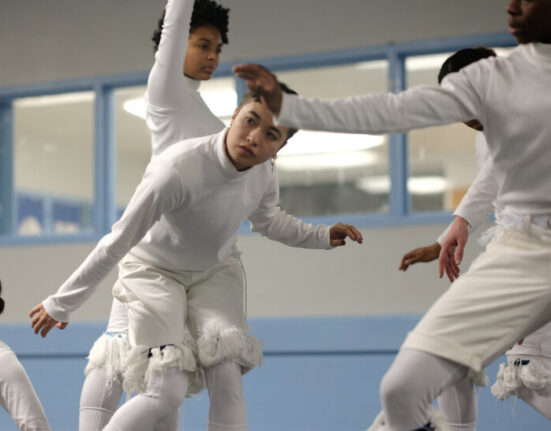Down the hall from the chambers where the Madison City Council meets, a group of teenagers in matching navy blue jail fatigues gathers around a table in Dane County’s Juvenile Detention Center.
The room is largely gray, soaked in fluorescent light. A few guards, older Sheriff’s Office staff, wait outside behind the thick plexiglass windows.
But on the table in front of the teens sit microphones and a laptop — part of an ongoing podcasting class led by Dee Star, who has taught the course at the detention center for the past year.
Over two days, Star teaches the group the basics of recording and interviewing. From there, a subject is brought in for the class to interview. Guests have included real estate agents, rappers, clothing designers and anti-mass incarceration activists.
Dee Star, a podcast facilitator with the Madison Public Library’s Bubbler program, speaks with youth at the Dane County Juvenile Detention Center in Madison. Over a two-day course, Star teaches the teens how to record a podcast then brings in a subject for them to interview.
“They can see, ‘Wow, this is a real person who really does this,'” Star said.
People are also reading…
Star’s class is part of Making Justice, a workshop and art program for at-risk and incarcerated youth that’s run out of The Bubbler, a community art program within the Madison Public Library.
Star’s mission with Making Justice is to “plant that seed” of curiosity in the arts or business and then be “off to the next kid.”
“I cannot even tell you how many times I’ve asked the question, ‘What do you want to be?'” Star said. “So many kids say, ‘I don’t know if I’m going to be alive.’ The ‘I don’t know’ is totally fine when you’re 15, 16. But to say you’re probably not going to be alive? It’s heartbreaking.”
Since its 2014 beginnings, Making Justice has strived to bring the tools of artistic expression to the community’s youth. Whether they are caught up in the court system, at risk of ending up there, actually incarcerated or just looking for something to do, the kids served by the program are introduced to the joys of painting, music, fashion, videography and more.
And they’re learning from some of the best. Over the years, some of the city’s most-established artists and culture makers have staffed the program and worked as artists-in-residence.
For his part, Star is a rising personality in the local podcasting scene. His program, “OuttaDeeBox,” features guests who have been formerly incarcerated and activists fighting against mass incarceration.
Then there’s Jerry Butler, a remarkable painter and muralist who has twice been an artist-in-residence with the program.
Over the years, Butler, other artists and youth incarcerated at the Juvenile Detention Center have remade the interior of the space, replacing alienating blank walls with murals teeming with color and inspiration. In the center’s intake room, a giant heart now covers the wall. Another mural depicts a blue landscape and stairs, adorned with a quote from Martin Luther King Jr.: “Faith is taking the first step even when you don’t see the whole staircase.”
“To me, it makes the space a little softer,” Butler said. “To come into these spaces, and usually there’s not anything to look at. You hardly notice the wall. You just notice the feeling. But if you can notice what’s on the wall, you can lessen the impact somewhat. I can’t say how much, because it’s a difficult thing for these kids.”
When working with teens on the murals, Butler likes to make his presence “low-key” and advisory. The teens come up with the ideas for the project and execute the design and build trust and relationships among themselves, he said.
Murals take anywhere from a week to months to complete. And since there’s plenty of turnover in the lockup, different groups have a say in the final design.
Several murals have been created through a collaboration between the Madison Public Library’s Bubbler program and incarcerated youth at the Dane County Juvenile Detention Center. Launched in 2014, The Bubbler’s Making Justice program has partnered with teens to create projects spanning visual art, music, videography, clothing design and more.
“One of the things I want to do is let them know that you may be in this space right now, but if you can imagine yourself anywhere, then that imagination can take you to places you want to be,” Butler said.
Data to action
Making Justice emerged as a reaction to a 2013 report on racial disparities in the Madison area called “Race to Equity.”
That report, published by the Wisconsin Council on Children and Families, found alarming educational achievement gaps between Black and white youth. Those disparities extended to the experience of Black youth in the criminal justice system.
In 2010, Black teens in Dane County were six times more likely than white ones to be arrested while their peers outside of Madison were only three times more likely to be arrested.
An updated report released this year didn’t analyze criminal justice data but found that disparities persist in areas considered upstream from incarceration, such as education, class and health. Black children in Dane County, for example, face a poverty rate about seven times higher than white children. They also feel less safe in their classrooms, perform worse on standardized tests and change schools more often than white students.
While it is a key focus, the work of Making Justice goes far beyond area youth who are already incarcerated. Organizers tout a citywide impact and a depth of creativity from the program’s participants that spans many artistic mediums. At Lakeview Library, collages of broken CDs made by participants spell out the word “teens.”
Participants have shot and produced music videos touching on complex, difficult themes, from gun violence to the relationship between a mother and a daughter.
“The mentorship element of it allows them to open up,” said Rob Franklin, also known as Rob Dz, head of media projects for The Bubbler. “When we come in, we’re able to share our challenges, our shortcomings, where we bumped our heads. It opens them up.”
Branching out
At first, projects Franklin oversaw in Making Justice stuck to hip-hop productions. But over time, it’s branched off into video work and other forms of visual art.
“If we can just figure out a way to provide some type of spark,” Franklin said. “I’m not saying everybody’s going to be a podcaster. I’m not saying everybody’s going to be a rapper. But the whole goal is to at least get kids to really be inspired in some type of way.
“If that aspiration keeps them on the straight and narrow, or make some adjustments as far as the trajectory of their career path, that’s all we can hope for.”
Madison Public Library teen services librarian Jesse Vieau meets with advocates of the library’s Bubbler program, including Jerry Butler, left. “It’s the word of mouth,” Vieau said. “When the kids are talking about it, you’ve got something.
For Jesse Vieau, a teen services librarian, the reaction from kids who have come in and out of the program show that staff are delivering on that spark.
Even for kids who have gone in and out of detention, the arrival of Bubbler staff is one constant they have.
“We’re really cautious about what we commit ourselves to, because we know kids have been let down and we’re not trying to be a part of the letdown,” Vieau said. “It’s the word of mouth. When the kids are talking about it, you’ve got something. The follow-through is listening to them.”
Where are they now? The stories of 8 people who were pardoned by Gov. Tony Evers
Matthew Riehle can now summit mountains in Canada
Matthew Riehle, 40, an outdoorsman who summited 82 mountains in 2021, said he is excited to start climbing mountains in Canada.
He was barred from traveling there before he got pardoned in February 2020 for dealing marijuana in the early 2000s. This summer, he plans to go to the Bugaboos, a mountain range in the Purcell Mountains in British Columbia.
Riehle’s pardon has also allowed him to do contracting in South Carolina for his construction business. Before, both South Carolina and Virginia had prohibited him from getting a license there because of his one conviction.
He said getting pardoned was “pretty amazing.” He encourages anyone with small drug convictions in Wisconsin to seek out a pardon.
“The mistakes we make as youths should not dictate our entire lives,” Riehle said.
Michelle Roberson Nance wants to ‘to do right by’ her pardon
Michelle Roberson Nance, 43, is a single mother of three, a volunteer and an educator from Milwaukee.
Roberson Nance was a teacher for 15 years, which she loved, but needed to take a break from while going through a divorce. Now she’s working as a truck driver, but has hopes to start her own business. She also serves in her church in the kitchen, childcare department and for community work.
Her first and only offense was from more than 20 years ago when she used customers’ credit cards to buy things while working at K-Mart. She was pardoned for the conviction in January.
“That was an amazing feeling. It was a huge relief off my shoulders because I’ve been wanting this forever,” Roberson Nance said of getting pardoned. “I don’t just want that piece of paper, I want to do right by it.”
She wants to become the owner of a childcare center because she loves being a role model for the children who live in her area.
Eric Pizer’s ‘longtime battle’ for a pardon is ‘finally over’
Eric Pizer, 41, is a decorated Iraq War combat veteran who wanted a pardon to pursue a career in law enforcement.
Pizer was convicted of a felony after throwing one punch that broke a man’s nose on a night of drinking when he was 23, only two days back from being deployed in Iraq. Pizer was trying to break up a argument between his friend and a jealous husband when he heard the husband say, “I’m going to … kill you.” Pizer said the punch was a “knee-jerk reaction” after coming back from a war zone.
Pizer was one of the first to get a pardon from Evers in October 2019. But in the more than two years since, Pizer said he “could not get anywhere” when applying to jobs at local police departments. He’s not sure what he was doing wrong.
Pizer, who lives in Baraboo, said his pardon did help him get a recent job at a railroad services company. Now he’s working as a mason at Bear Creek Masonry in Lone Rock.
While Pizer hasn’t achieved his career aspirations, he said getting the pardon was still “extremely meaningful” to him.
“Just mentally for myself, I’m not carrying that weight anymore,” Pizer said. “It’s just a longtime battle and stress that’s finally over.”
Kimm Laursen: ‘If I want to do something, I am free to do it.’
For Kimm Laursen, 66, of Cumberland, his pardon is less about any immediate plans and more about how, “if I want to do something, I am free to do it,” he said. He could run for local office or go hunting.
Laursen was granted clemency for buying a stolen motorcycle about 40 years ago when he was partying and struggling with alcohol. Now 34 years sober, Laursen has volunteered with alcohol and drug treatment facilities, including Hazelden Betty Ford Foundation centers in Minnesota.
Laursen said his pardon shows that he “did some stupid things” and “paid the price,” but “that’s not who I am.”
Laursen has been a barber for nearly 40 years, and is now “semi-retired.” He sometimes still works at the barbershop with his son.
Laursen declined to provide a photo of himself. Above is a photo of Cumberland, Wisconsin.
Anthony Cooper says his pardon shows ‘change is possible’
Anthony Cooper Sr., 44 — the CEO of Focus Interruption, a local organization that aims to prevent and address violent crime, and the vice president of reentry services and strategic partnerships for the Nehemiah Center for Urban Leadership Development, a group that works to strengthen Madison’s African American community — was pardoned in February 2021 for dealing drugs and fleeing police more than 20 years ago.
Cooper said news articles written about his years of community work helped him overcome barriers even before he was granted clemency. But now his pardon is another way to “explain who I am to people who don’t know me,” he said. Having the pardon already helped when he was looking for a new apartment recently.
But Cooper said his pardon is about more than just making life easier to navigate. It’s also for his wife, sons and grandchildren. It’s a document that shows “change is possible.”
“Me getting a pardon, it’s not just about me,” Cooper said. “It’s about … being able to show generations to come that we all make bad choices in our lives, but it’s about how we come from that.”
‘Very grateful’: Rev. Mwangi Vasser is working as a hospice chaplain
Rev. Mwangi Vasser, 43, said he’s been doing well since getting pardoned in October 2019, but “there are still some hurdles here and there.”
Vasser was pardoned for cocaine possession when he was 19. He went on to earn his bachelor’s in biblical studies, master’s in theology and doctorate in theology and divinity. He’s been been a counselor, minister, barber and certified nursing assistant for hospice care.
He sought the pardon to pursue his dream of becoming a military chaplain so he could serve his country while spreading God’s teachings. Vasser now works in Georgia as a hospice chaplain, helping provide spiritual comfort to those who are dying. He believes his pardon helped him get the job.
He’s also been able to go hunting with friends and purchase a firearm for home protection, which he keeps in a locked safety box away from his family.
“I’m very grateful to have the pardon,” Vasser said. “It just feels good to know that that one thing is not hanging over your head or is not preventing you from excelling in life.”
Kathryn Morrow says her pardon ‘meant so much’
Kathryn Morrow, 39, who lives in Hartford, was pardoned in November 2020 for a burglary and theft conviction from when she was 23 and struggling with a drug addiction.
She relapsed and broke into her parents house to get her belongings after they said she couldn’t come home. They pressed charges. Morrow said she was grateful because the conviction was “the catalyst” for her making changes in her life.
Morrow completed probation, went through extensive rehabilitation and got her bachelor’s and master’s degrees. She now works as a drug and alcohol prevention specialist, trying to help prevent children from going down the path of addiction.
Morrow initially sought the pardon so she could further her career by becoming a nurse. She faced challenges with that because it was unclear whether she’d be able to get licensed. But she said the pardon was still worth it.
Morrow said she was always embarrassed of having a felony conviction “hanging over my head.” Now she feels relief.
“It just meant so much to have the state of Wisconsin say that they recognize that I’ve made amends and have turned my life around,” she said.
Syreeta Robinson: ‘One bad decision is not the end of your life’
Syreeta Robinson, 40, said her pardon from Evers has broken down barriers. She was able to get a job as a probation officer — a position she was previously denied, likely because of her identity theft conviction from her early 20s. She used the store credit of another person along with a group of friends.
After serving her sentance, she earned her bachelor’s degree in social work from UW-Milwaukee and worked for many years at a domestic violence shelter.
Robinson is excited to help steer people on the right path as a probation officer.
“I wanted to be in a space where I could mentor someone and lead them after they made a bad decision because one bad decision is not the end of your life,” Robinson said of her reason for becoming a probation officer. “If I can reach just a few people in my life, in my career, hopefully we can make a change in the system.”
Dee Star is a rising personality in the local podcasting scene. His program, “OuttaDeeBox,” features guests who have been formerly incarcerated and activists fighting against mass incarceration.







